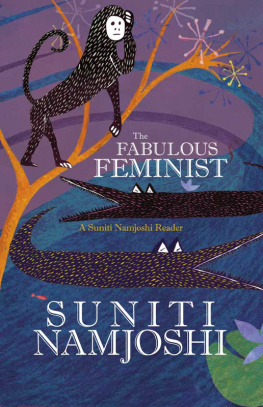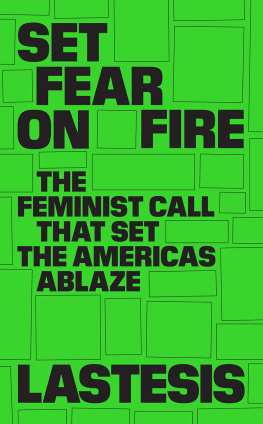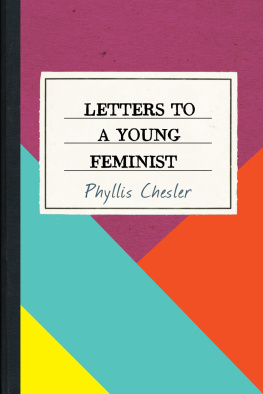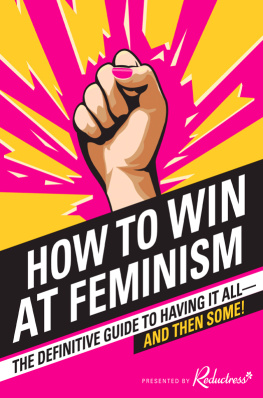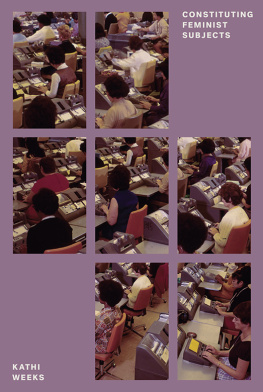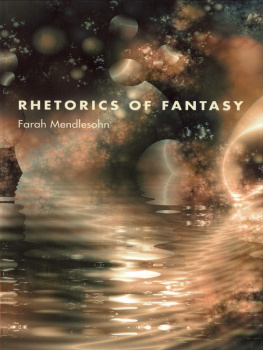Suniti Namjoshi - The Fabulous Feminist
Here you can read online Suniti Namjoshi - The Fabulous Feminist full text of the book (entire story) in english for free. Download pdf and epub, get meaning, cover and reviews about this ebook. year: 2013, publisher: Zubaan Books, genre: Art. Description of the work, (preface) as well as reviews are available. Best literature library LitArk.com created for fans of good reading and offers a wide selection of genres:
Romance novel
Science fiction
Adventure
Detective
Science
History
Home and family
Prose
Art
Politics
Computer
Non-fiction
Religion
Business
Children
Humor
Choose a favorite category and find really read worthwhile books. Enjoy immersion in the world of imagination, feel the emotions of the characters or learn something new for yourself, make an fascinating discovery.
- Book:The Fabulous Feminist
- Author:
- Publisher:Zubaan Books
- Genre:
- Year:2013
- Rating:3 / 5
- Favourites:Add to favourites
- Your mark:
- 60
- 1
- 2
- 3
- 4
- 5
The Fabulous Feminist: summary, description and annotation
We offer to read an annotation, description, summary or preface (depends on what the author of the book "The Fabulous Feminist" wrote himself). If you haven't found the necessary information about the book — write in the comments, we will try to find it.
The Fabulous Feminist — read online for free the complete book (whole text) full work
Below is the text of the book, divided by pages. System saving the place of the last page read, allows you to conveniently read the book "The Fabulous Feminist" online for free, without having to search again every time where you left off. Put a bookmark, and you can go to the page where you finished reading at any time.
Font size:
Interval:
Bookmark:
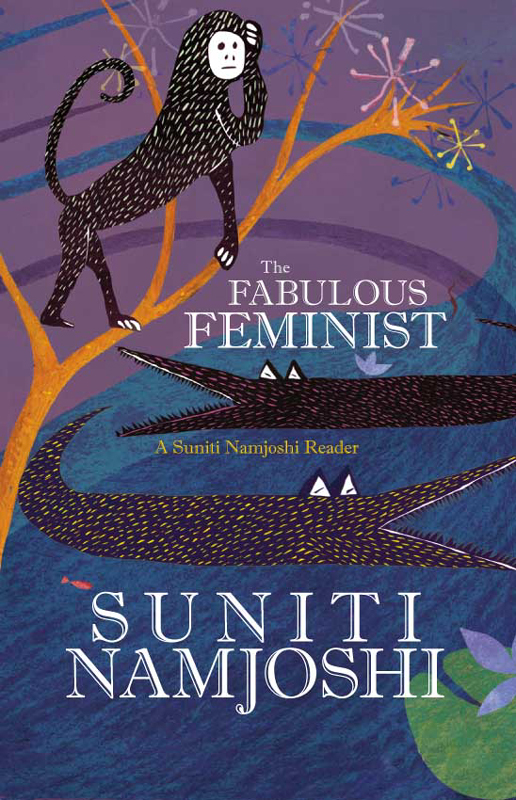

ZUBAAN
an imprint of Kali for Women
128 B Shahpur Jat, 1st floor
NEW DELHI 110 049
Email:
www.zubaanbooks.com
Copyright Suniti Namjoshi, 2012
All rights reserved
10 9 8 7 6 5 4 3 2 1
eBook ISBN: 9789383074228
Print source ISBN: 9789381017333
This eBook is DRM-free.
Zubaan is an independent feminist publishing house based in New Delhi with a strong academic and general list. It was set up as an imprint of Indias first feminist publishing house, Kali for Women, and carries forward Kalis tradition of publishing world quality books to high editorial and production standards. Zubaan means tongue, voice, language, speech in Hindustani. Zubaan is a non-profit publisher, working in the areas of the humanities, social sciences, as well as in fiction, general non-fiction, and books for young adults that celebrate difference, diversity and equality, especially for and about the children of India and South Asia under its imprint Young Zubaan.
Typeset in Bembo 11/13 by Jojy Philip, New Delhi 110 015
Printed at Raj Press, R-3 Inderpuri, New Delhi 110 012

F eminist Fables was a breakthrough for me. On my sabbatical in England in 197879, I discovered feminismor rather I discovered that other feminists existed. I was only a beginner feminist. I thought a great many of the restrictions on women were absurd and, as a woman, I didnt much like being a second class citizen. The feminists had already done a great deal of analysing, and I read avidly. But I needed to work out things for myself. And now I had confidence. I dont mean the sort of confidence that comes from being patted on the head and told that I matter too. I mean the confidence that comes from knowing that I would be heard and understood.
For a writerfor anyone reallythats supremely important. A poem or a fable exists between the writing of it and the reading of it. If I started out with the feeling that, however careful I was about what I said, it was not going to be understood in the way I intended, then it was almost impossible to begin. But now content and form came gloriously together. If something didnt make sense, I wrote a fable about it. If I thought something was absurd and made a joke, I knew that there were people around who would laugh at it.
Sheba Feminist Publishers, who first published the book in 1981thirty years agogave it the title Feminist Fables. It seemed like a good title, and Ive kept it over the years. (I had called the original manuscript The Monkey and the Crocodiles.) The existing title has the advantage of being firmly feminist, and thats important, I think, especially now that the word feminist has become almost a bad word in the west. It has the disadvantage of making the careless reader think that the fables are concerned only with what happens to women. The fable form should make it clear that they question what happens to anyone whenever theres an imbalance of power. Theres nothing particularly womanly or manly about the mouse in the The Mouse and the Lion, its just a clever little creature who has understood the subtle ways in which might is right establishes itself.
Its not possible to grow up in India without seeing the different kinds of disparities in power all around unless, of course, we choose to blind ourselves deliberately as in The Secret Wisdom. But to vie with one another about which kind of oppression is the most oppressive is, in my opinion, a bad mistake. I saw that happen at the First International Feminist Book Fair held in London in 1984. As long as we think that some forms of oppression are all right or dont matter as much, we dont get to the root of the problem.
Theres one more thing I want to add here. This incident pre-dates Feminist Fables. I think it happened at the college where I taught at the University of Toronto. A colleague said to me sympathetically that the oppression of women in India must be really terrible. I didnt like that and replied fiercely that here (meaning here in Toronto) a persons status depends on one or two factors, but that in India many factors such as caste, class and wealth have to be taken into consideration. There may have been some truth in my reply. What was wrong was my reaction. I didnt like to think of myself as oppressed. What I should have understood was that if half a dozen factors militate against a person, that makes the oppression that much worse. What I should also have understood is that being oppressed isnt shameful, its doing the oppressing that is so very wrong. But that is hard. Language (the words noble and ignoble for example), tradition (the way in which we exalt great military conquerors) and the social hierarchy make it difficult to see that.
If Feminist Fables is about any one thing, then that is what it is about. It uses the very power of language and the literary tradition to expose what is absurd and unacceptable.

In the holy city of Benares there lived a brahmin, who, as he walked by the riverbank, watching the crows floating downstream, feeding on the remains of half-burnt corpses, consoled himself thus: It is true that I am poor, but I am a brahmin, it is true that I have no sons, but I, myself, am indisputably a male. I shall return to the temple and pray to Lord Vishnu to grant me a son. He went off to the temple and Lord Vishnu listened and Lord Vishnu com plied, but whether through absent-mindedness or whether for some other more abstruse reason, he gave him a daughter. The brahmin was disappointed. When the child was old enough, he called her to him and delivered himself thus: I am a brahmin. You are my daughter. I had hoped for a son. No matter. I will teach you what I know, and when you are able, we will both meditate and seek guidance. Though only a woman, she was a brahmin, so she learned very fast, and then, they both sat down and meditated hard. In a very short time Lord Vishnu appeared. What do you want? he said. The brahmin couldnt stop himself. He blurted out quickly, I want a son. Very well, said the god, Next time around. In his next incarnation the brahmin was a woman and bore eight sons. And what do you want? he said to the girl. I want human status. Ah, that is much harder, and the god hedged and appointed a commission.

After the event Little R. traumatized. Wolf not slain. Forester is wolf. How else was he there exactly on time? Explains this to mother. Mother not happy. Thinks that the forester is extremely nice. Grandmother dead. Wolf not dead. Wolf marries mother. R. not happy. R. is a kid. Mother thinks wolf is extremely nice. Please to see shrink. Shrink will make it clear that wolves on the whole are extremely nice. R. gets it straight. Okay to be wolf. Mama is a wolf. She is a wolf. Shrink is a wolf. Mama and shrink, and forester also, extremely uptight.

The god chases Daphne. Daphne runs away. Daphne is transformed into a green laurel. What does it mean? That thats what happens to ungrateful women? Daphne says, Yes. She says, Yes. Yes. Yes. Apollo is pleased. Then he gets bored. Girl chases god. It is not very proper. Daphne gets changed. Into what is she changed? Daphne is changed into a green laurel. What does it mean? That thats what happens to ungrateful women. Daphne says, Yes. Then she keeps quiet. Her timing is right. Daphne gets changed. Into what is she changed? Daphne is changed into a green laurel. And what does it mean? It means, it obviously means, that trees keep quiet.
Font size:
Interval:
Bookmark:
Similar books «The Fabulous Feminist»
Look at similar books to The Fabulous Feminist. We have selected literature similar in name and meaning in the hope of providing readers with more options to find new, interesting, not yet read works.
Discussion, reviews of the book The Fabulous Feminist and just readers' own opinions. Leave your comments, write what you think about the work, its meaning or the main characters. Specify what exactly you liked and what you didn't like, and why you think so.

